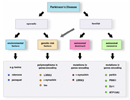Parkin, PINK1 and mitochondrial integrity: emerging concepts of mitochondrial dysfunction in Parkinson's disease
Pilsl A, Winklhofer KF.
06.11.2011
Mitochondria are dynamic organelles which are essential for many cellular processes, such as ATP production by oxidative phosphorylation, lipid metabolism, assembly of iron sulfur clusters, regulation of calcium homeostasis, and cell death pathways. The dynamic changes in mitochondrial morphology, connectivity, and subcellular distribution are critically dependent on a highly regulated fusion and fission machinery. Mitochondrial function, dynamics, and quality control are vital for the maintenance of neuronal integrity. Indeed, there is mounting evidence that mitochondrial dysfunction plays a central role in several neurodegenerative diseases. In particular, the identification of genes linked to rare familial variants of Parkinson's disease has fueled research on mitochondrial aspects of the disease etiopathogenesis. Studies on the function of parkin and PINK1, which are associated with autosomal recessive parkinsonism, provided compelling evidence that these proteins can functionally interact to maintain mitochondrial integrity and to promote clearance of damaged and dysfunctional mitochondria. In this review we will summarize current knowledge about the impact of parkin and PINK1 on mitochondria.




